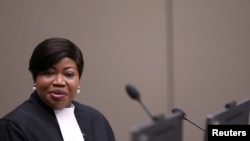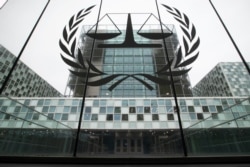The prosecutor of the International Criminal Court is vowing to “stand firm” after U.S. President Donald Trump authorized sanctions against the court, which is probing suspected war crimes by U.S. troops in Afghanistan.
Fatou Bensouda, originally from Gambia, told VOA that she would not be swayed from her mission of prosecuting international war criminals.
“These attacks constitute an escalation and an unacceptable attempt to interfere with the rule of law and the court's judicial proceedings,” Bensouda said Monday in her first interview since Trump's remarks. “An attack on the ICC also represents an attack against the interests of victims of atrocity crimes, for many of whom the ICC represents the last hope for justice.”
Trump authorized sanctions on Thursday against the ICC, which has indicated it is investigating alleged war crimes and crimes against humanity by U.S. troops in Afghanistan as well as alleged crimes by Afghan and Taliban forces. Bensouda has not further specified the types of crimes being investigated.
U.S. Secretary of State Mike Pompeo noted that the U.S. is not party to the court and warned allies from NATO countries that they too could be targeted for their actions in Afghanistan. In March when the ICC’s investigation was first authorized, Pompeo slammed the court as being politically motivated and vowed to take “all necessary measures” to protect U.S. citizens.
“This is a truly breathtaking action by an unaccountable political institution, masquerading as a legal body,” Pompeo said. “It is all the more reckless for this ruling to come just days after the United States signed a historic peace deal on Afghanistan, which is the best chance for peace in a generation. Indeed, the Afghan government itself pleaded with the ICC not to take this course. But the ICC politicians had other goals.”
The sanctions could impose financial and travel restrictions on ICC employees and their families. U.S. Attorney General William Barr has also announced the U.S. Department of Justice has evidence of corruption in the office of the ICC prosecutor but has not elaborated on it publicly.
'Naked attempts to interfere'
Bensouda had her visa to travel to the U.S. revoked last year but said she has been able to visit New York several times since then to brief the U.N. Security Council on her office’s work.
“The visa restrictions, the threats and the other measures that were announced by the U.S., I see as naked attempts to interfere with the court’s judicial and prosecutorial independence to meet political objectives,” she said. “And we regret the aggressive position that has been taken by the U.S. government, not least given the country's long-standing contribution to the field of international criminal justice.”
Critics of the ICC’s actions have pointed out that it operates on the principle of “complementarity,” meaning it is only authorized to prosecute crimes when national courts are unable or unwilling to do so. In the U.S., military courts have tried cases involving service members and convicted numerous soldiers for crimes committed in Afghanistan.
“The United States, under any fair reading of the facts, has complied with its obligations under domestic and international law, including the Convention Against Torture,” Brett Schaefer, a senior research fellow at The Heritage Foundation told Fox News.
Bensouda said the Rome Statute which established the court allows the U.S. to challenge the jurisdiction of the court or the admissibility of the case. The cases her office is investigating were deemed not to have been previously prosecuted.
“An appeals panel of independent, international professional judges authorized my investigations into the situation in Afghanistan following submissions that have been made by all stakeholders, including victims,” she said.
Bensouda added that the court is accustomed to anger from countries where it operates. In recent years, a number of African heads of state have criticized the court for disproportionately targeting Africans and called for African countries to withdraw from the ICC.
“Because of the nature of our work, because we are challenging the status quo because we will exercise our jurisdiction without fear or favor, we will expect this pushback,” Bensouda told VOA. “It is not going to be the last time that this is happening to the court.”





